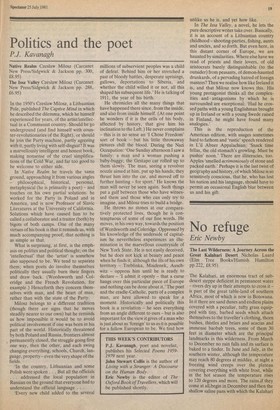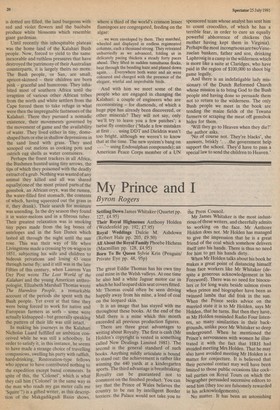No refuge
Eric Newby
The Last Wilderness: A Journey Across the Great Kalahari Desert Nicholas Luard (Elm Tree Books/Hamish Hamilton pp.222, £8.95) The Kalahari, an enormous tract of subdesert steppe deficient in permanent water — rivers dry up in their attempts to cross it — is part of the great table-land of southern Africa, most of which is now in Botswana. In it there are sand dunes and endless plains covered with a peculiar, tufty grass equipped with tiny, barbed seeds which attach themselves to the traveller's clothing, thorn bushes, thistles and briars and acacias and immense baobab trees, some of them 30 feet in diameter which are the principal landmarks in this wilderness. From March to December no rain falls and its surface is baked to a tinder. In June and July, in the southern winter, although the temperature may reach 80 degrees at midday, at night a freezing wind creeps over the plateau covering everything with white frost, while in the hot season the temperature rises to 120 degrees and more. The rains,if they come at all,begin in December and then the shallow saline pans with which the Kalahari is dotted are filled, the land burgeons with red and violet flowers and the baobabs produce white blossoms which resemble giant gardenias.
Until recently this inhospitable plateau was the home land of the Kalahari Bush people. Now, forced to yield to the same inexorable and ruthless pressures that have destroyed the patrimony of their Australian counterparts, it is largely theirs no more. The Bush people, or San, are small, apricot-skinned — their children are born pink — graceful and humorous. They inhabited most of southern Africa until the irruption of various other African tribes from the north and white settlers from the Cape forced them to take refuge in what were then the impregnable fastnesses of the Kalahari. There they pursued a nomadic existence, their movements governed by the movement of game and the availability of water. They lived either in tiny, domeshaped huts or else in shallow depressions in the sand lined with grass. They used scooped out melons as cooking pots and ostrich egg shells as water containers.
Perhaps the finest trackers in all Africa, the Bushmen hunted using tiny arrows, the tips of which they poisoned with the deadly extract of a grub. Nothing was wasted of any animal they killed and all was shared equally(one of the most prized parts of the gemsbok, an African oryx, was the rumen, the water-filled first stomach, the contents of which, having squeezed out the grass in it, they drank). Their search for moisture was unending. In the dry season they found it in water-melons and in a fibrous tuber. Their greatest relaxation was in smoking tiny pipes made from the leg bones of antelopes and in the Sun Dance which lasted all through the night until the sun rose. This was their way of life when Livingstone made a crossing by ox-wagon in 1851, subjecting his wife and children to hideous privations and losing 43 oxen through tsetse fly; and it still was in the late Fifties of this century, when Laurens Van Der Post wrote The Lost World of the Kalahari and the young American anthropologist, Elizabeth Marshall Thomas wrote The Harmless People, a remarkable account of the periods she spent with the Bush people. Yet even at that time they were being forced to work for native and European farmers as serfs — some were actually kidnapped — but generally speaking the pattern of their life was still intact.
In making his journeys in the Kalahari Nicholas Luard fulfilled an ambition conceived while he was still a schoolboy. In order to satisfy it, in this instance, he seems to have made a strange choice of travelling companions, swelling his party with raffish, hard-drinking. Restoration-type fellows who appear to have contributed nothing to the expedition except bana) comments. In spite of this, the 'Colonel', which is what they call him ('Colonel' in the same way as the man who reads my gas meter calls me 'Squire'?) is a gifted writer, as this description of the Makgadikgadi Basin shows, where a third of the world's crimson lesser flamingoes are congregated, feeding on the algae: . . . we were enveloped by them. They marched, wheeled and displayed in endless regimented columns, each a thousand strong. They retreated unhurriedly as we advanced, folding us in delicately pacing thickets a steady forty paces ahead. They lifted in sudden tumultuous flocks, beat through the bending haze and planed down again. . . Everywhere both water and air were coloured and charged with the presence of the elegant, wistful and improbable birds.
And with him we meet some of the people who are engaged in changing the Kalahari: a couple of engineers who are reconnoitring — for diamonds, of which a huge pipe has already been discovered, or other minerals? They will not say, only 'we'll try to leave you a few patches'; a tsetse fly controller ('Made a few mistakes at first . . . using DDT and Dieldrin wasn't too bright, although we weren't to know that at the time. The new system's bang on . . . — using Endosulphan compounds); an American Peace Corps member of a UN sponsored team whose analyst has sent him to count crocodiles, of which he has a terrible fear, in order to cure an equally powerful abhorrence of chickens (his mother having kept them in Virginia). Perhaps the most incongruous are twoVenezuelan bankers, father and son, drinking Laphroaig in a camp in the wilderness which is more like a suite at Claridges, who have paid in the region of $100,000 to shoot big game legally.
And there is an indefatigable lady missionary of the Dutch Reformed Church whose mission is to bring God to the Bush people and having done so persuade them not to return to the wilderness. The only Bush people we meet in the book are tending the maize fields of the Tswana farmers or scraping the meat off gemsbok hides for them.
Will they go to Heaven when they die?' the author asks.
'No of course not. They're blacks', she answers, briskly `. . .the government help support the school. They'd have to pass a special law to send the children to Heaven.'



































 Previous page
Previous page